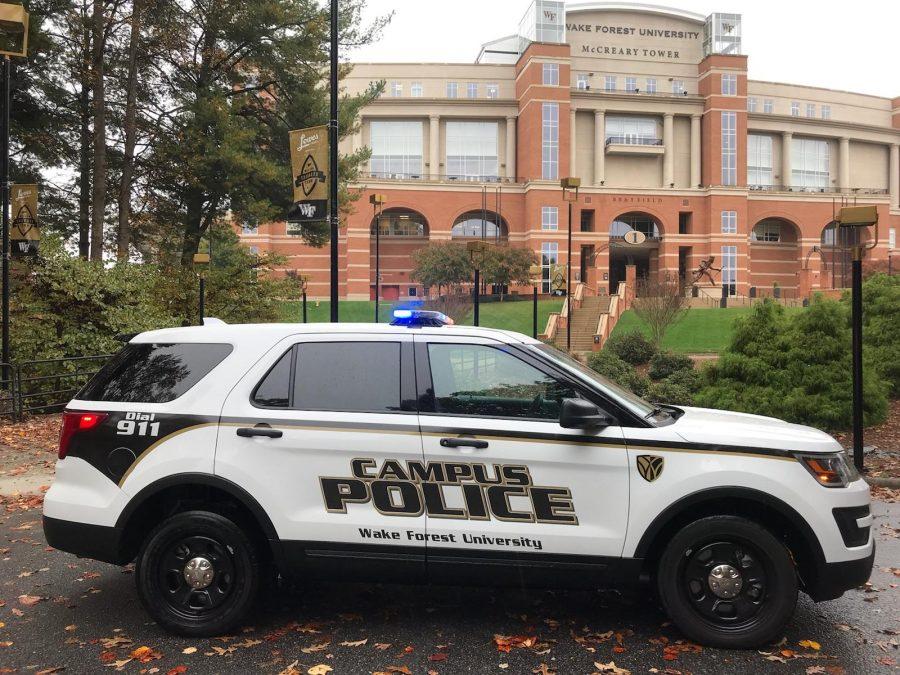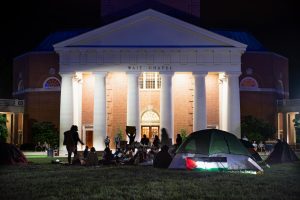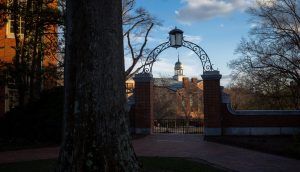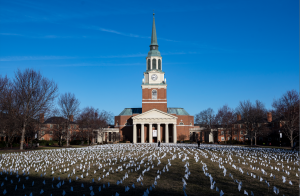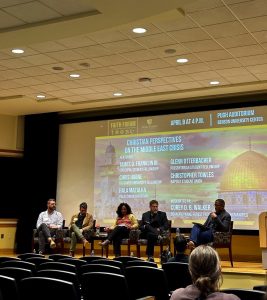Campus police undergoes accreditation process
Members of the Wake Forest community shared their thoughts during an open forum
A University Police car is parked outside of Truist Field.
June 25, 2022
On June 4, the International Association of Campus Law Enforcement Administrators (IACLEA) began the on-site portion of Wake Forest University Police Department’s accreditation process.
University Police has voluntarily invited a team of assessors from the IACLEA to inspect the department’s policies, procedures, management, operations and support services in order to gain accreditation. Chief of Police Regina Lawson described it as “a highly prized recognition of campus public safety professional excellence”, according to a press release.
In order to be awarded accreditation, University Police must provide documentation of compliance to 215 standards identified by professionals in the police industry.
University Police received its initial accreditation in 2008, making Wake Forest the first university in the United States to receive IACLEA accreditation. Wake Forest was a part of the IACLEA’s pilot program to help set the standard for accreditation in other campus police departments.
This first accreditation began an ongoing process with the IACLEA and the University Police. Now, the onsite inspection occurs every three years to ensure that the department continues to exceed the highest standards of policy and procedures.
To encourage community involvement in this process, the university and IACLEA assessors hosted an open forum on Monday, June 6 to allow students, faculty and the public to comment on the campus police department.
“It was an opportunity for those we serve to share their concerns and feedback — positive or negative — as to engage the community that we serve as a part of our process so that feedback can be shared with the assessors,” Lawson said.
For those who could not attend but wished to submit comments, an option to submit written comments was provided as well. According to Lawson, the informal feedback they have received is positive, but the department will not hear the formal feedback until their formal briefing with the assessors next Wednesday.
Members of the Police Advisory Board and other faculty members attended the forum and commented or answered questions from the assessors about the University Police’s performance. Individuals commented on the diversity of the department and student-police relationships, among other topics.
Dr. Rian Bowie, associate teaching professor in the Department of English and outgoing chair of the Police Advisory Board noted that the police department should continue to improve its connections with populations on campus that may be distrustful of police.
“One place I think we need to figure out is how to do outreach to communities that are predisposed not to trust police, underrepresented students and groups and workers who are not employed by Wake Forest . . .” Bowie said at the forum. “I think this body has been trying to think about this for a while.”
Bowie added that one of the largest challenges is diversifying the police force which, as Associate Dean of Students Dr. Jim Settle described, is mainly a result of a lack of candidates.
“I served on hiring committees for some of the senior leadership, and we have not been able to attract a candidate pool in the police and other areas of campus life, simply because campus life has a low pay structure,” Settle said during the forum. “You can’t get people in the door to apply because our salaries are too low, there is no one to sell to.”
Settle did note, though, that the current team strives to resolve broader issues in the campus community.
“Chief Lawson and the leadership team are very willing to explore and resolve the issues around race, underserved and historically distrustful communities,” Settle said. “That is a constant concern of mine is working directly with students who feel the police are not supportive of them or out to get them are not going to be a part of our campus community. Chief Lawson has been an example of working through those issues, holding her staff accountable, and setting the standard for what she expects.”
The University Police have worked to establish relationships with students as well.
“Police are willing to meet with National Panhellenic Council Leadership so that students that may have had very negative interactions with police in their home towns or states or countries are very aware of how they can be supported here by our police,” Settle said at the forum.
Settle added later: “I find Wake Forest leadership and the officers who are working day to day to really be exceptional examples of that Venn-diagram of law enforcement, community policing and working to manage the unique differences on our campus at Wake Forest.”
Aware of complex and varied opinions of law enforcement on campus and around the nation, Lawson hopes that the accreditation will provide reassurance that the University Police is continually improving and enhancing their department so that they can be the best they can be. However, Lawson knows not everyone will think this way.
“I think what we need to understand is that safety means different things to different people,” Lawson said. “For some members of our community, police presence makes them feel safe, and for some members of our community police presence may actually make them feel unsafe. My hope is that [the accreditation] says to people: ‘we’re striving to be the best that we can be.’”
Following the re-accreditation, the department plans to continue to improve relationships with students and other members of the Wake Forest community. They will do this through events like Pizza with the Police, annual collegiate trust talks and also by simply being smiling faces on campus.
“We want to be perceived as not just law enforcement,” Lawson said. “We give escorts, and we respond to a lot of students in crisis — and not just students — but other members of the community as well.”
The University Police met with assessors on Wednesday, June 8. The assessors include Chief Charles L. Simpson Jr., Associate Vice President of Police and Public Safety at St. Augustine’s University in Raleigh, NC., and Dr. Sonya Johnson, Police Planning and Research Managers at the Albany Police Department in Albany, GA.
If the department passes, it will be referred to the Commission on Accreditation at the IACLEA and will receive its re-accreditation certificate at the annual conference. Accreditation lasts four years, during which the University Police will submit yearly reports to prove their continued compliance with the standards under which it was initially accredited.


